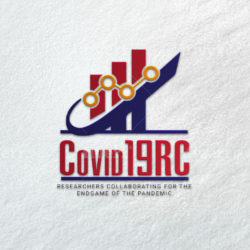This page has information about the different research projects carried out by covid-19-research-conduit.org members. You may also want to consult the European Economic Association central registry of Covid-19 projects where many of these projects and some others are registered.
Jump to: i. testing and surveys; ii. data and corrected estimates; iii. epidemiological models and analysis; iv. economic impact; v. attitudes, moral and legal issues
I. Testing and surveys
Tracking the impact of COVID-19 on UK households: In the context of a longitudinal household survey (by Understanding Society/UK), this project designs and fields a monthly web survey to track health and economic developments rapidly, and contextualize them in data from the past eleven years and future waves of regular data collection. Contact: Thomas Crossley.
Economic impact in Africa: Design and implementation of a survey on micro and small businesses in Kenya. Contact: Julian Jamison.
Random testing with a survey in Vermont: Now moving to the pilot stage. Contact: Eline M. van den Broek-Altenburg.
Cross-country representative survey: We are conducting representative surveys in 6 countries (Italy, UK, US, South Korea, Japan, China) to (1) evaluate the costs of the measures imposed by public authorities as well as their social acceptance, (2) assess the behavioural responses of people to the Covid crisis and the recommendations/measures in place. The data will be made available shortly. Contact: Michèle Belot.
Survey among diagnosed people in Italy: We aim at conducting a survey among positively diagnosed people in Italy. Similar questions will be asked as in “Cross-country representative survey” (see above). The goal will be to assess the importance of different channels of disease transmission. Contact: Michèle Belot.
II. Data and corrected estimates
Estimates of true infection rates: An analysis to determine the actual number of people infected rather than the number of reported cases. Contact: Jan Kulveit.
Estimating true mortality: In several countries using a diff-in-diff variation on excess mortality methods. Contact: Andrea Galeotti.
Mortality in Lombardia: Analyzing why the mortality rate was so high. Contact: Andrea Ichino.
Effective methods of mass testing: Analysis of sample pooling methods. Contact: Christian Gollier.
III. Epidemiological models and analysis
Improving allocation modes for critical medical resources and enhancing distribution of COVID-19 convalescent plasma (CCP) for therapy. Scott Duke Kominers, Parag A. Pathak, Tayfun Sönmez, M. Utku Ünver, M. Bumin Yenmez study triage protocol designs and propose a reseve based system of medical resource allocation. In a related strand of research, they test methods to expand access to convalescent plasma therapy through market design.
Effects of governmental restrictions on Covid spread – a cross-country analysis. This project aims at evaluating the effects of the measures implemented by governments on the spread of Covid-19, across a selected sample of countries (European countries mainly). We will use data collected by the Oxford Government Response Tracker on measures implemented, as well as data on reported number of cases and hospitalizations to measure the spread of the disease. We will also aim at exploiting variation in the implementation of measures at a more regional level in some countries (such as the UK, Germany, Italy, Spain and France). We will conduct a difference-in-differences analysis, allowing for a lag of 14 days for the measures to have an impact on hospitalizations. Contact: Nurfatima Jandarova.
Internal and External Effects of Social Distancing in a Pandemic: Farboodi, Jarosch, and Shimer integrate individual optimality and policy analysis into the SIR model in a unified fashion using optimal control. They show that the equilibrium response to Covid-19 is consistent with observed social distancing in micro-data. Optimal policy acts quickly, is long-lasting, but mild and allows herd immunity to emerge. Contact: Gregor Jarosch.
Adjustment of individuals: How spontaneous social distancing by people influences the path of the epidemic. Contact: Flavio Toxvaerd.
Safe opening in Italy: Using epidemiological simulation to do cost-benefit analysis of eliminating restrictions with a focus on the role of age. Contact: Andrea Ichino
Using SEIR models to asses the impact of different restrictions on the spread of Covid-19: Looking for a viable exit strategy this project simulates a scenario in which the lockdown is partially lifted while long-range transmissions of the contagion are strictly prevented. Such strategy may limit significantly the spread of a second wave. Bloomberg reported on this project. Contact: Arnout Van De Rijt.
Testing and age composition using SIR: We are studying testing and age-composition in the Covid-19 epidemic. We augment a standard SIR epidemiological model with individual choices regarding how much time to spend working and consuming outside the house, both of which increase the risk of transmission. Individuals who have flu symptoms are unsure whether they caught Covid-19 or simply a common cold. Testing reduces the time of uncertainty. Individuals are heterogeneous with respect to age. Younger people are less likely to die, exacerbating their willingness to take risks and to impose externalities on the old. We explore heterogeneous policy responses in terms of testing, confinements, and selective mixing by age group. Contact: Philipp Kircher.
IV. Economic Impact
Ability to work from home (WFH) across countries: A comparative study producing valuable data in the context of assessing the impact of social distancing measures. A first paper here. Contact: Charles Gottlieb.
Labor market impact: How the COVID-19 pandemic affects the labor market and leads to segmentation between those recovered and those not yet infected. The model is also used to analyze optimal policy. Contact: Peter Rupert.
V. Attitudes, moral and legal issues
Comparative research on the perception of COVID-19: This project aims at investigating how people perceive the virus as a global threat and what are the opinions and attitudes concerning policies implemented by medical and political authorities. It studies the representations and surveys the attitudes and reactions of public opinion in a context of the COVID-19 pandemic through a variety of countries differently exposed to the coronavirus. The project is has been conceived to be implemented in a short period and to offer deliverables that may be useful for academics but also immediately for public decision-makers. Contact: Hanspeter Kriesi.
